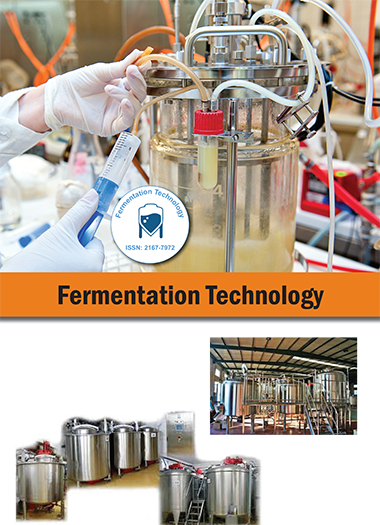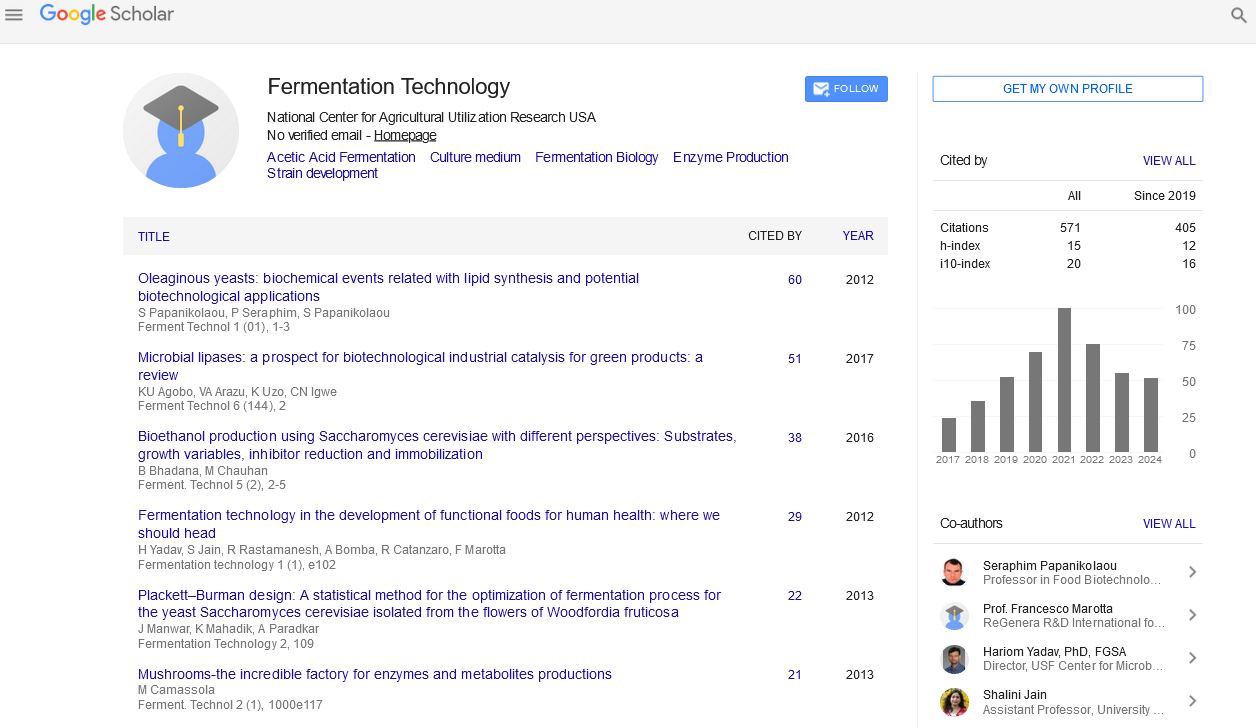Indexed In
- Open J Gate
- Genamics JournalSeek
- Access to Global Online Research in Agriculture (AGORA)
- RefSeek
- Hamdard University
- EBSCO A-Z
- OCLC- WorldCat
- Publons
Useful Links
Share This Page
Journal Flyer

Open Access Journals
- Agri and Aquaculture
- Biochemistry
- Bioinformatics & Systems Biology
- Business & Management
- Chemistry
- Clinical Sciences
- Engineering
- Food & Nutrition
- General Science
- Genetics & Molecular Biology
- Immunology & Microbiology
- Medical Sciences
- Neuroscience & Psychology
- Nursing & Health Care
- Pharmaceutical Sciences
Perspective - (2024) Volume 13, Issue 1
Genetic Engineering Advances: Enhancing Wine Yeasts
Agustin Hugo*Received: 26-Feb-2024, Manuscript No. FMT-24-25556; Editor assigned: 28-Feb-2024, Pre QC No. FMT-24-25556 (PQ); Reviewed: 13-Mar-2024, QC No. FMT-24-25556; Revised: 20-Mar-2024, Manuscript No. FMT-24-25556 (R); Published: 27-Mar-2024, DOI: 10.4172/2167-7972.24.13.172
Description
In recent years, the wine industry has faced challenges associated with the increasing ethanol content in wines, leading to concerns regarding consumer health, product quality, and sustainability. Ethanol, while a natural byproduct of fermentation, contributes to the overall alcohol content of wine, which can affect its taste, odour, and texture. To address this issue, researchers have been exploring biotechnological approaches aimed at lowering ethanol yield during the fermentation process. This article explores some of these innovative strategies and their potential significance for the wine industry.
Ethanol formation in wine fermentation
Before exploring biotechnological interventions, it's essential to understand the mechanisms behind ethanol production during wine fermentation. Saccharomyces cerevisiae, commonly known as brewer's yeast, is the primary microorganism responsible for fermenting grape sugars into ethanol and carbon dioxide. The conversion of glucose and fructose into ethanol occurs via glycolysis and following fermentation methods, where pyruvate is converted into ethanol and carbon dioxide.
Genetic engineering of yeasts
One potential biotechnological approach involves genetic engineering of yeast strains to modulate their metabolic paths and reduce ethanol production. Researchers have focused on fundamental enzymes involved in ethanol synthesis, such as pyruvate decarboxylase and alcohol dehydrogenase, to manage their activity and redirect carbon flux towards alternative metabolic pathways. By increasing the production of metabolites like glycerol or acetic acid, it's possible to decrease ethanol yield while maintaining fermentation efficiency and wine quality.
Metabolic engineering for ethanol reduction
Metabolic engineering techniques offer another method for lowering ethanol content in wine. This approach involves the control of cellular metabolic networks to optimize desired metabolic outcomes. By modifying or removing specific genes involved in ethanol production or its precursors' metabolism, researchers can adapt yeast strains to produce wines with reduced ethanol levels. Additionally, the inclusion of non- Saccharomyces yeast species or bacteria with desirable fermentation characteristics can further expand the metabolic pathways involved, providing novel strategies for ethanol reduction.
Hybridization and breeding programs
Conventional breeding and hybridization programs also play a significant role in developing yeast strains with reduced ethanol-producing capabilities. By crossing different yeast strains and selecting for specific characteristics through successive generations, breeders can develop new varieties with customized fermentation profiles. This approach allows for the inclusion of natural genetic variation to achieve ethanol reduction without using to genetic modification techniques.
Impact on wine quality and flavor
While the primary goal of ethanol reduction is to address health and sustainability concerns, it's essential to consider its impact on wine quality and characteristics. Lowering ethanol content can influence various aspects of wine, including taste, odour, and aging potential. Biotechnological interventions must find a balance between ethanol reduction and preserving the unique characteristics that define high-quality wines. Evaluations through taste analysis and analytical techniques can help to evaluate the effects of ethanol reduction on wine composition and flavor profile, guiding further refinement of biotechnological strategies.
In conclusion, the search for biotechnological solutions to reduce ethanol yield during wine fermentation represents a potential method for aiming industry challenges related to alcohol content, consumer preferences, and sustainability. Genetic engineering, metabolic engineering, breeding programs, and hybridization provide various approaches for modulating yeast metabolism and optimizing fermentation outcomes. However, it's essential to evaluate the potential impacts of ethanol reduction on wine quality and sensory characteristics to ensure that bio-technological interventions align with consumer expectations and industry standards. As research in this field continues to advance, the wine industry may soon benefit from innovative technologies that enable the production of wines with reduced ethanol content without compromising on taste or quality.
Citation: Hugo A (2024) Genetic Engineering Advances: Enhancing Wine Yeasts. Ferment Technol. 13:172.
Copyright: © 2024 Hugo A. This is an open-access article distributed under the terms of the Creative Commons Attribution License, which permits unrestricted use, distribution, and reproduction in any medium, provided the original author and source are credited.

